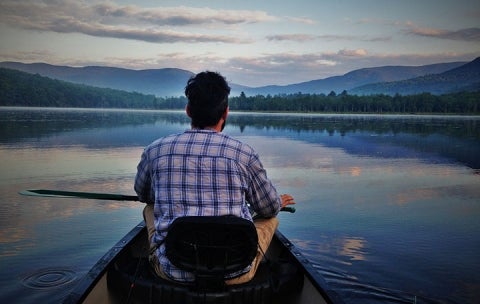Note: Yale School of the Environment (YSE) was formerly known as the Yale School of Forestry & Environmental Studies (F&ES). News articles and events posted prior to July 1, 2020 refer to the School's name at that time.

I have read many definitions of what is a conservationist, and written not a few myself, but I suspect that the best one
is written not with a pen, but with an axe. It is a matter of what a man thinks about while chopping, or while deciding what to chop. A conservationist is one who is humbly aware that with each stroke he is writing his signature on the face of his land.
—Aldo Leopold A Sand County Almanac
A favorite among woodsmen, Aldo Leopold’s adage still strikes a chord today. The sentiment guides many of us to the woods and not a few of us to the halls of the Yale School of Forestry & Environmental Studies. Yet like conservation, the education of a forester is not with pen and paper alone, but with boots on the ground and a Biltmore stick in hand.
The Yale Apprentice Forester Program, or Crew, offers such an opportunity. Situated on the 7,860-acre Yale-Myers Forest, the apprenticeship is a 12-week intensive program in forest management.
The Yale Forest Manager, Julius Pasay, and Director, F&ES Professor Mark Ashton, provide space and guidance for students to learn, make (a lot of) mistakes, and eventually excel in their capacity as professional land managers. The first ten weeks cover forest chainsaw safety, road maintenance, boundary surveying, biophysical inventory, silvicultural prescriptions, and — a crew favorite — timber marking.
Environmental film screenings, bi- monthly seminars, and field trips also punctuate the summer. This past summer included a trip to the Providence Water Authority, a seminar on bats, bird ecology and call identification, alpine ecology in Maine, and numerous interactions with local landowners. Each highlighted the importance of ecosystem diversity, resilience, and rural livelihoods. Each clarified our role as foresters to promote them.
At the conclusion of 10 weeks, the apprenticeship puts the crew to the test. Relocating to one of Yale’s northern forests, the crew is tasked to replicate and execute everything they learned during the prior 10 weeks — this time on their own. And by the end, Professor Ashton gleefully notes, “The crew graduates from their nappies” and into realm of professional foresters.
Yet, the summer’s greatest reward is not the program’s completion. Instead, it is the opportunity to be a part of the Yale School Forests narrative. It is the knowledge that past crews shaped the landscape of today, and the present crew helped paint it’s future. In this sense, the crew actively lives Leopold’s quote, only with paint guns to mark timber in place of an axe.
About the Author
Nick Olson is a second-year student in the Master of Forestry program at the Yale School of Forestry & Environmental Studies.
